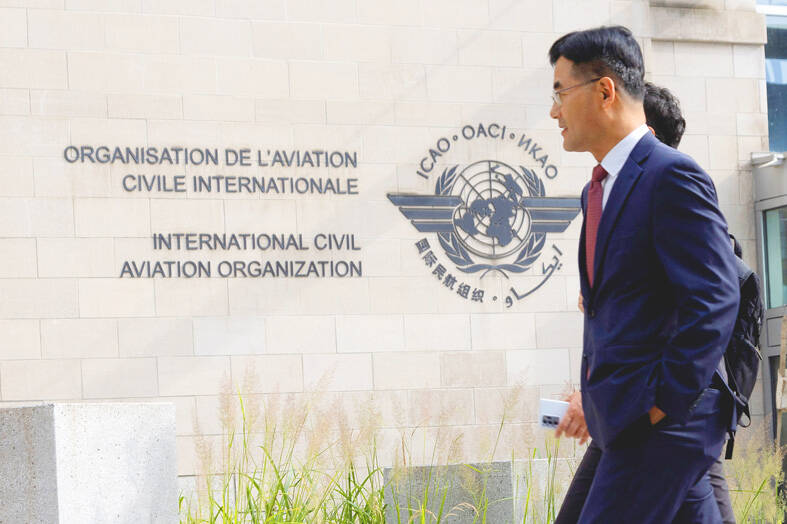Twenty-eight members of the European Parliament have sent a joint letter to leaders of the International Civil Aviation Organization (ICAO) and the EU to express concern over China’s unilateral decision to alter the M503 flight path.
The letter, which was sent on Wednesday last week, was addressed to ICAO Council President Salvatore Sciacchitano, European Commission President Ursula von der Leyen, European Council President Charles Michel, EU High Representative for Foreign Affairs and Security Policy Josep Borrell, European Commissioner for Climate Action Frans Timmermans and European Commissioner for Transport Adina Valean.
Jan-Christoph Oetjen, vice president of the European Parliament and vice chair of the Committee on Transport and Tourism, posted the letter on X yesterday, calling on the ICAO to “take immediate action.”

Photo: Reuters
Beijing on Jan. 30 announced changes to the M503 flight path, breaking its agreement with Taiwan that southbound flights on the route should operate 6 nautical miles (11km) southwest of the route.
Two days later, it commenced the W122 and W123 eastbound routes, which the two sides had agreed not to launch before confirming the details of their implementation.
Carrying out the changes without prior consultation with Taiwan “are in direct violation of established agreements between the two sides,” the letter said.
The actions also contravened section 4.2.6 of the ICAO’s Air Traffic Services Planning Manual, which stipulates that establishing and changing flight routes should be made “only after they have been coordinated with all parties concerned,” it said.
The letter said that China’s moves “are politically motivated,” as they were taken shortly after Taiwan completed its presidential and legislative elections on Jan. 13, and “without tangible evidence to demonstrate there are real traffic issues to be addressed.”
“This raises concerns about aviation infrastructure being used as a tool for geopolitical pressure,” it said.
Making the alterations unilaterally posed risks to regional stability and predictability, “potentially leading to misunderstandings and escalations” across the Taiwan Strait, it added.
Launching new routes would also “challenge air traffic management and raise the likelihood of incidents or accidents,” it said.
The disregard for Taiwan’s interests further hinders the nation’s participation in the ICAO, which “not only undermines Taiwan’s rights, but also hampers global efforts to ensure aviation safety,” the letter said.
The parliamentarians called for actions from the ICAO to “ensure compliance with established regulations and agreements.”
“It is essential to uphold the principles of transparency, cooperation, and respect for international norms in the management of civil aviation,” the letter added.
In Taipei, the Ministry of Foreign Affairs yesterday thanked the parliamentarians for expressing concern over the issue.
The signatories include members of four major parties in the European Parliament — the European People’s Party, Renew Europe, the European Conservatives and Reformists and the Greens/EFA Group — which showed that clear consensus exists in the parliament regarding China’s unilateral behavior and support for peace and stability in the Taiwan Strait, the ministry said in a press release.

A magnitude 7.0 earthquake struck off Yilan at 11:05pm yesterday, the Central Weather Administration (CWA) said. The epicenter was located at sea, about 32.3km east of Yilan County Hall, at a depth of 72.8km, CWA data showed There were no immediate reports of damage. The intensity of the quake, which gauges the actual effect of a seismic event, measured 4 in Yilan County area on Taiwan’s seven-tier intensity scale, the data showed. It measured 4 in other parts of eastern, northern and central Taiwan as well as Tainan, and 3 in Kaohsiung and Pingtung County, and 2 in Lienchiang and Penghu counties and 1

A car bomb killed a senior Russian general in southern Moscow yesterday morning, the latest high-profile army figure to be blown up in a blast that came just hours after Russian and Ukrainian delegates held separate talks in Miami on a plan to end the war. Kyiv has not commented on the incident, but Russian investigators said they were probing whether the blast was “linked” to “Ukrainian special forces.” The attack was similar to other assassinations of generals and pro-war figures that have either been claimed, or are widely believed to have been orchestrated, by Ukraine. Russian Lieutenant General Fanil Sarvarov, 56, head

FOREIGN INTERFERENCE: Beijing would likely intensify public opinion warfare in next year’s local elections to prevent Lai from getting re-elected, the ‘Yomiuri Shimbun’ said Internal documents from a Chinese artificial intelligence (AI) company indicated that China has been using the technology to intervene in foreign elections, including propaganda targeting Taiwan’s local elections next year and presidential elections in 2028, a Japanese newspaper reported yesterday. The Institute of National Security of Vanderbilt University obtained nearly 400 pages of documents from GoLaxy, a company with ties to the Chinese government, and found evidence that it had apparently deployed sophisticated, AI-driven propaganda campaigns in Hong Kong and Taiwan to shape public opinion, the Yomiuri Shimbun reported. GoLaxy provides insights, situation analysis and public opinion-shaping technology by conducting network surveillance

‘POLITICAL GAME’: DPP lawmakers said the motion would not meet the legislative threshold needed, and accused the KMT and the TPP of trivializing the Constitution The Legislative Yuan yesterday approved a motion to initiate impeachment proceedings against President William Lai (賴清德), saying he had undermined Taiwan’s constitutional order and democracy. The motion was approved 61-50 by lawmakers from the main opposition Chinese Nationalist Party (KMT) and the smaller Taiwan People’s Party (TPP), who together hold a legislative majority. Under the motion, a roll call vote for impeachment would be held on May 19 next year, after various hearings are held and Lai is given the chance to defend himself. The move came after Lai on Monday last week did not promulgate an amendment passed by the legislature that